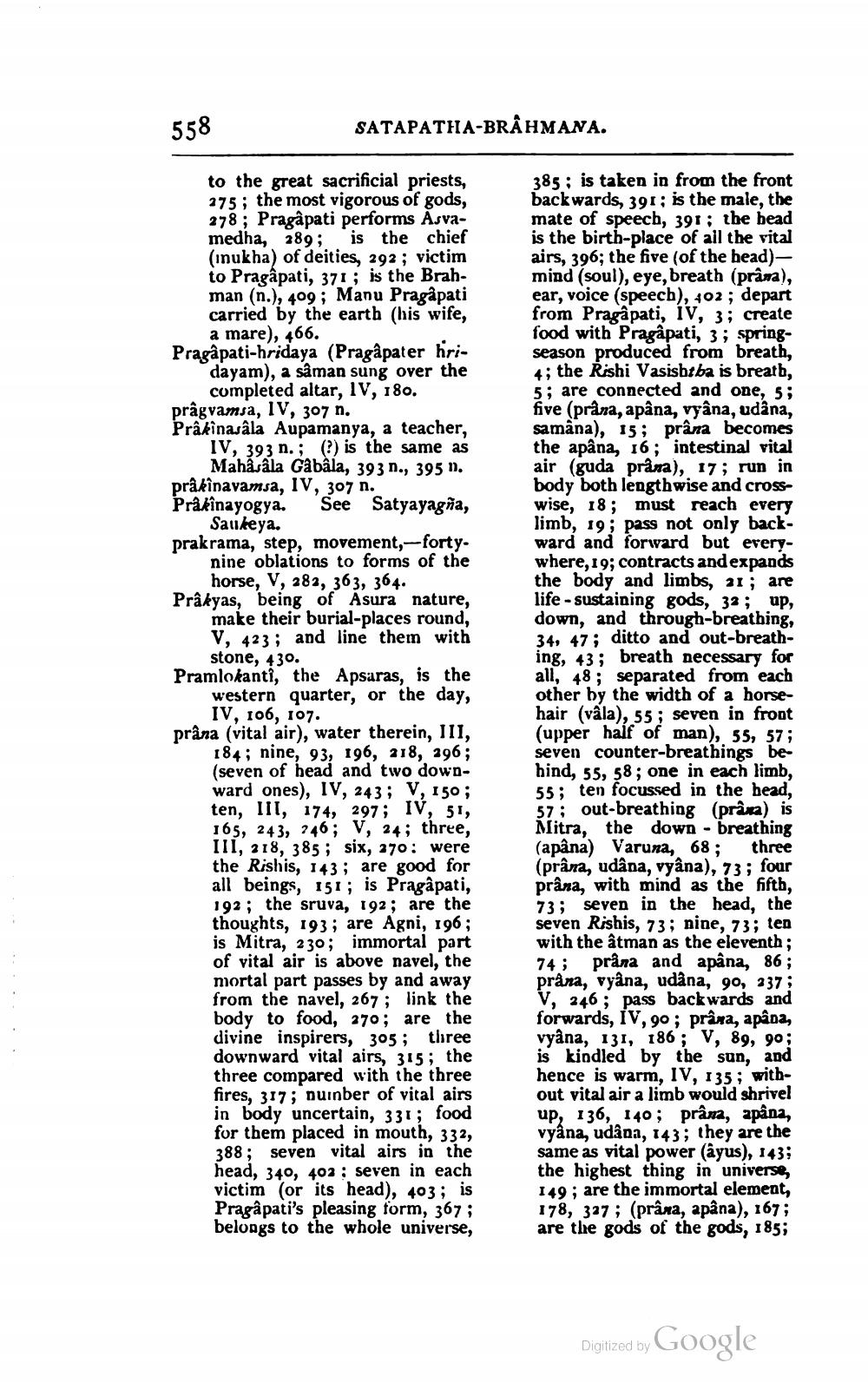________________
558
SATAPATHA-BRAHMANA.
to the great sacrificial priests, 275; the most vigorous of gods, 278; Pragâpati performs Asvamedha, 289; is the chief (inukha) of deities, 292 ; victim to Pragâpati, 371; is the Brahman (n.), 409; Manu Pragapati carried by the earth (his wife,
a mare), 466. Pragâpati-hridaya (Pragâpater hri
dayam), a såman sung over the
completed altar, IV, 180. prâgvamsa, IV, 307 n. Prakinasala Aupamanya, a teacher,
IV, 393 n.; (?) is the same as
Mahåsala Gabâla, 393 n., 395 1. pråkinavamsa, IV, 307 n. Prakînayogya. See Satyayagña,
Saukeya. prakrama, step, movement, forty
nine oblations to forms of the
horse, V, 282, 363, 364. Prakyas, being of Asura nature,
make their burial-places round, V, 423; and line them with
stone, 430. Pramlokanti, the Apsaras, is the
western quarter, or the day,
IV, 106, 107. prâna (vital air), water therein, III,
184; nine, 93, 196, 218, 296; (seven of head and two downward ones), IV, 243; V, 150; ten, III, 174, 297; IV, 51, 165, 243, 246; V, 24; three, III, 218, 385 ; six, 270: were the Rishis, 143; are good for all beings, 151; is Pragapati, 192; the sruva, 192; are the thoughts, 193; are Agni, 196; is Mitra, 230; immortal part of vital air is above navel, the mortal part passes by and away from the navel, 267; link the body to food, 270; are the divine inspirers, 305; three downward vital airs, 315; the three compared with the three fires, 317; Duinber of vital airs in body uncertain, 331; food for them placed in mouth, 332, 388; seven vital airs in the head, 340, 403 ; seven in each victim (or its head), 403; is Pragâpati's pleasing form, 367; belongs to the whole universe,
385; is taken in from the front backwards, 391; is the male, the mate of speech, 391; the head is the birth-place of all the vital airs, 396; the five (of the head) - mind (soul), eye, breath (prawa), ear, voice (speech), 402; depart from Pragapati, IV, 3; create food with Pragapati, 3 ; springseason produced from breath, 4; the Rishi Vasisbaba is breath, 5; are connected and one, 5; five (prana, apana, vyâna, udana, samâna), 15; prâna becomes the apâna, 16; intestinal vital air (guda prana), 17; run in body both lengthwise and crosswise, 18; must reach every limb, 19; pass not only backward and forward but everywhere, 19; contracts and expands the body and limbs, 21; are life - sustaining gods, 32; up, down, and through-breathing, 34, 47; ditto and out-breathing, 43; breath necessary for all, 48; separated from each other by the width of a horsehair (vâla), 55 ; seven in front (upper half of man), 55, 57; seven counter-breathings behind, 55, 58; one in each limb, 55; ten focussed in the head, 57 ; out-breathing (prana) is Mitra, the down - breathing (apâna) Varuna, 68; three (prâna, udâna, vyâna), 73; four prâna, with mind as the fifth, 73; seven in the head, the seven Rishis, 73; nine, 73; ten with the âtman as the eleventh; 74 ; prana and apana, 86; prana, vyana, udana, go, 237; V, 246; pass backwards and forwards, IV, 90 ; prâna, apâda, vyâna, 131, 186; V, 89, 90; is kindled by the sun, and hence is warm, IV, 135; without vital air a limb would shrivel up, 136, 140; prâna, apana, vyana, udana, 143; they are the same as vital power (ayus), 143; the highest thing in universe, 149; are the immortal element, 178, 327; (prâna, apâna), 167; are the gods of the gods, 185;
Digitized by Google




